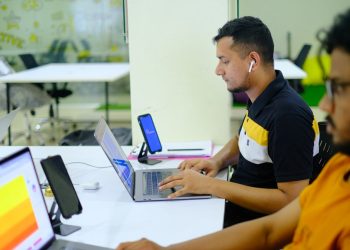No products in the cart.
The Future of Work: Navigating AI’s Impact on Jobs
As AI transforms industries, concerns mount over job displacement. This analysis dives into the implications for young professionals navigating their careers.
In a world increasingly defined by technology, the words of Federal Reserve Chair Jerome Powell echo like a warning bell: “We are concerned about the impact of artificial intelligence on the job market.” The once-unthinkable notion that machines might replace human labor is now a pressing reality. As we stand at the crossroads of innovation and job security, the implications of AI for the workforce are profound, particularly for young professionals.
The rise of AI is not just a story of technological advancement; it is a narrative steeped in human emotion and uncertainty. As students graduate into a rapidly evolving job market, they face a dual-edged sword. On one side lies the promise of efficiency, increased productivity, and new opportunities. On the other, the specter of job displacement looms large.

Consider the story of Maria, a 24-year-old data analyst in a bustling tech hub. Maria’s days are filled with crunching numbers and generating insights. Yet, she constantly feels the pressure of automation creeping into her field. “Every time I see a new AI tool, I wonder if it will make my job obsolete,” she confides. Maria’s apprehension is shared by many in her generation, who find themselves navigating a landscape where the skills they acquire today may not guarantee employment tomorrow.
To understand the complexities of AI’s impact, it’s essential to dive into the data. A recent report from the McKinsey Global Institute estimates that by 2030, up to 375 million workers globally may need to switch occupational categories due to automation and AI advancements. That’s roughly 14% of the global workforce, a staggering number that underscores the urgency of upskilling and reskilling initiatives.
That’s roughly 14% of the global workforce, a staggering number that underscores the urgency of upskilling and reskilling initiatives.
Yet, not all perspectives on AI’s role are doom and gloom. Some experts argue that while AI will displace certain jobs, it will also create new ones—roles that we can’t even imagine today. The World Economic Forum predicts that AI will generate 97 million new jobs by 2025, emphasizing the need for adaptability in the face of change.
In this dynamic environment, educational institutions play a crucial role. Universities and vocational schools are increasingly tasked with equipping students with the skills necessary to thrive in an AI-driven economy. Programs focusing on data literacy, coding, and critical thinking are becoming staples in curricula around the world. For instance, initiatives like the AI for Youth program in Canada aim to teach young people the fundamentals of AI, fostering a generation of innovators rather than passive participants in a rapidly changing job market.
However, the responsibility doesn’t solely lie with educational institutions. Young professionals must take charge of their career trajectories. Continuous learning and adaptability are paramount. Online platforms like Coursera and Udemy have democratized access to knowledge, enabling individuals to learn at their own pace and tailor their skills to meet market demands.
But what about the ethical considerations? As AI systems increasingly influence hiring practices, concerns about bias and fairness have surfaced. Algorithms trained on historical data may perpetuate existing inequalities, raising questions about accountability. Companies must ensure their AI tools are developed with diversity and inclusion in mind, promoting a fair job market for all.
As we look ahead, the narrative surrounding AI and employment will continue to evolve. The key lies in embracing change while advocating for policies that promote workforce resilience. Governments, businesses, and educational institutions must collaborate to create pathways for continuous learning and job security.
Young professionals must take charge of their career trajectories.
The future of work is not predetermined; it is a tapestry woven by the choices we make today. As young professionals like Maria grapple with uncertainty, they must remember that adaptability, lifelong learning, and a proactive approach can turn challenges into opportunities. In this new era, the ability to pivot and reinvent oneself may very well be the most valuable skill of all.











